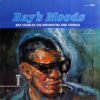“A Born Loser”
Song by Ray Charles
“A Born Loser”, a country song from the 1966 Ray’s Moods LP, demonstrates Ray Charles’ famous love for country music in a more raw and rural musical setting than that which had catapulted him to stardom on songs such as 1962’s “I Can’t Stop Loving You”.
(Note that this song is different than Ray’s 1962 classic “Born To Lose”.)
“I Can’t Stop Loving You”, in fact, was originally written and recorded by the same country star who was behind “A Born Loser”: Don Gibson. Ray often found that Gibson’s music resonated with him, and it always seemed to inspire an especially impassioned performance in him. As the album’s liner notes put it:
More of the Western quality is evident in the brassy, rhythmic “A Born Loser”.
As can be deduced from its title, the lyrics to “A Born Loser” are not exactly a defiant expression of pride. This time, the singer laments his failure to find a true love and bitterly reveals how he expects to continue his losing streak, in love and in life.
Well, actually, words like “lament” and “bitterly” don’t accurately describe the emotion of “A Born Loser” – in both Don Gibson’s 1965 single version and in this Ray Charles version, the pace is snappy and even cheerful. The band speeds along, resembling the earliest rock ‘n’ roll dance music more than anything else. The lyrics may be sad but the vocals are accepting of this fate, almost to the point of joviality.
To some listeners this jarring juxtaposition may come across as incongruent and insincere, while others may sense a revelation of deeper problems hidden within it. The man is acutely aware of his bad luck, and is so sure that it will continue that he no longer cares or considers any alternative.
But all that is in the eye of the beholder. The song is only two minutes long, and features more overtly country instrumentation than the sweeping, orchestral confections often found on Ray Charles “country” songs, so it’s easy to enjoy it without getting bogged down in any deep meaning. A chirpy guitar bobs along, and although a brass section punches through to give the song greater gravitas, it never buries the good-time pickin’ and grinnin’.
Ray, for his part, reacts to the Raelets that share the microphone with him by roaring out some of his patented soulful growls and musical wails, especially towards the end of “A Born Loser”. He sounds like he’s having the time of his life, totally at peace with himself and totally, still, in love with music. It’s a fine moment on a fine album.
